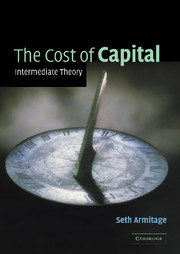Book contents
- Frontmatter
- Contents
- List of figures
- List of tables
- Preface
- Part I Expected Returns on Financial Assets
- Part II A Project's Cost of Capital
- Part III Estimating the Cost of Capital
- 12 The cost of equity: inference from present value
- 13 The cost of equity: applying the CAPM and multifactor models
- 14 Estimating a project's cost of capital
- 15 Regulated utilities
- References
- Index
14 - Estimating a project's cost of capital
Published online by Cambridge University Press: 05 June 2012
- Frontmatter
- Contents
- List of figures
- List of tables
- Preface
- Part I Expected Returns on Financial Assets
- Part II A Project's Cost of Capital
- Part III Estimating the Cost of Capital
- 12 The cost of equity: inference from present value
- 13 The cost of equity: applying the CAPM and multifactor models
- 14 Estimating a project's cost of capital
- 15 Regulated utilities
- References
- Index
Summary
The subject of this chapter is how to estimate the cost of capital of an existing or potential investment project that has not issued traded financial assets and is not regulated. There is no existing market price of the project and no historic record of market prices. The remarkable fact is that the cost of capital of an untraded project cannot be estimated directly without using an estimate of the expected rate of return on another asset. All respectable procedures involve, as part of the process, identifying one or more listed companies that are thought to be similar to the project, and then estimating the expected rates of return on the shares of these similar companies. Thus we have already considered, in the preceding two chapters, an indispensable step. The current chapter fills in the other steps in arriving at a project's weighted average cost of capital. It also discusses evidence of company practice, and offers a ranking of the decisions to be made in order of their impact on the final estimate of the WACC. It is hoped that, by the end of the chapter, the reader will have a clear view of the whole estimation process, and of what matters and what does not matter in the process.
Estimating a project's cost of equity
Cost of equity from pure-play companies
The estimation of a project's cost of equity requires the identification of similar listed companies – i.e. companies with shares of similar risk to the shares that would be issued, at least hypothetically, by the project.
- Type
- Chapter
- Information
- The Cost of CapitalIntermediate Theory, pp. 300 - 322Publisher: Cambridge University PressPrint publication year: 2005



